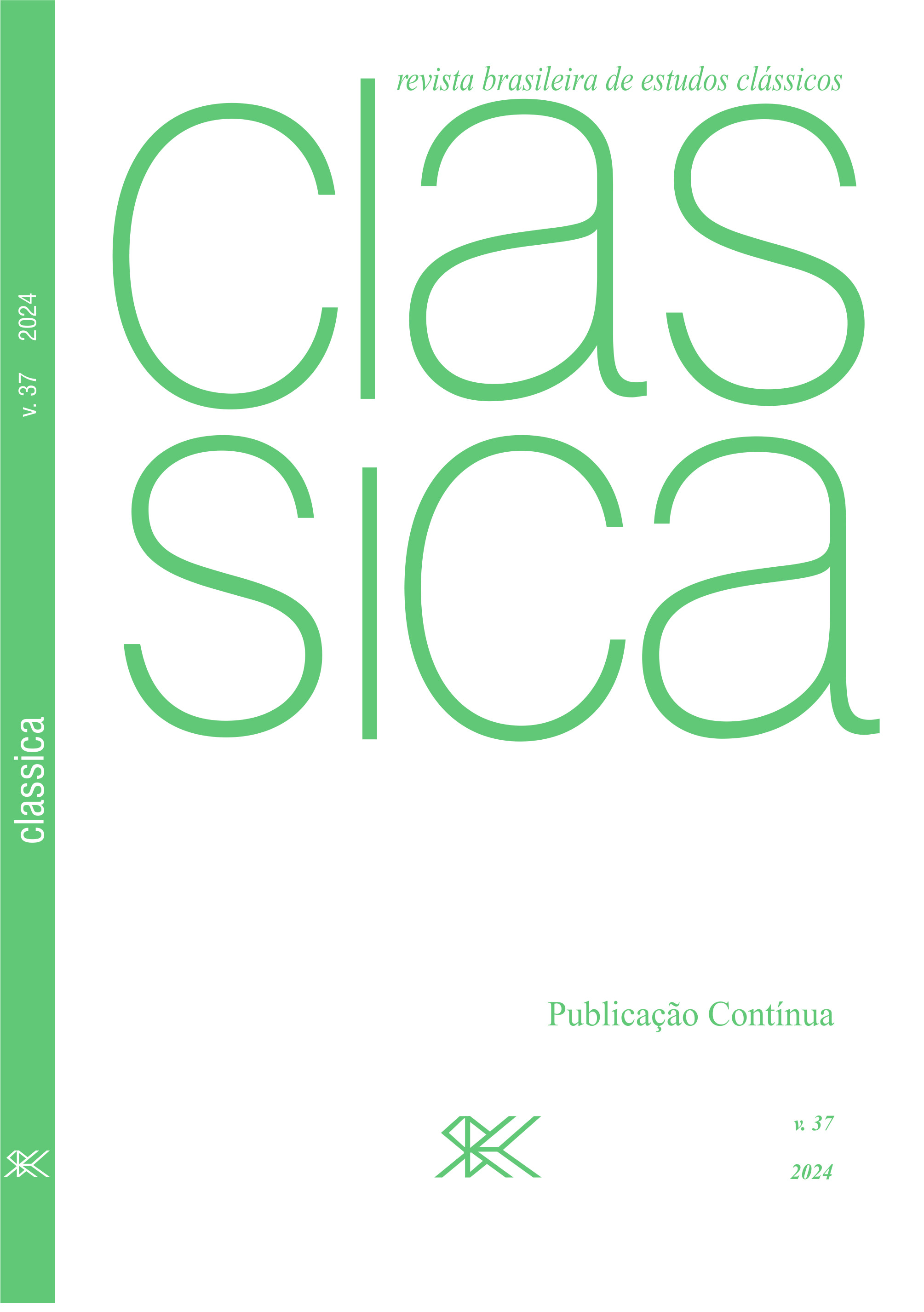A Tradição da Guerra Justa
um compromisso pragmático
DOI:
https://doi.org/10.24277/classica.v36.2023.1036Palavras-chave:
conflito; guerra justa; tradição da guerra justa; estado de guerra.Resumo
A Tradição da Guerra Justa dispôs as estruturas para pensarmos sobre a guerra por mais de dois mil anos. Embora os detalhes exatos possam variar um pouco, as ideias centrais são compartilhadas entre as culturas religiosa e secular, dando suporte ao direito internacional. No entanto, as respostas a atividades terroristas ou ataques “híbridos”, talvez envolvendo métodos predominantemente não letais, como a subversão e o desgaste cibernético ou econômico, deveriam realmente ser encaradas dentro de tais estruturas, quando muitos absolutamente não considerariam que tais contextos representam um estado de guerra? Este artigo argumenta que, apesar de seu nome, concentrando-se no dano em um sentido mais amplo e não em sua manifestação puramente letal, o tipo de raciocínio moral que a Tradição da Guerra Justa representa pode realmente ser aplicado a um conjunto muito mais amplo de contextos do que se poderia inicialmente imaginar. Isso significa que a Tradição da Guerra Justa continua sendo um guia útil mesmo quando o status exato da situação pode ser considerado pouco claro.
Downloads
Referências
ACKRILL, John (ed.) A New Aristotle reader. Oxford: Clarendon, 1990.
ALLEN, Nick. Just war in the Mahãbhãrata. In: SORABJI, Richard; RODIN, David (eds.). The ethics of war. Aldershot: Ashgate, 2007, p. 138-49.
AUGUSTINE. Political writings. Michael Tkacz, and Douglas Kries (trads.). Indianapolis: Hackett, 1994.
BELLAMY, Alex. Just wars: from Cicero to Iraq. Cambridge: Polity Press, 2006.
COATES, Anthony. Culture, the Enemy and the Moral Restraint of War. In: SORABJI, Richard; RODIN, David (eds.). The ethics of war. Aldershot: Ashgate, 2007, p. 208-21.
CHRISTOPHER, Paul. The ethics of war and peace: an introduction to legal and moral issues. Englewood Cliffs: Prentice Hall, 1994.
CICERO. On duties. Edition by Mirain T. Griffin and E. Margaret Atkins. Cambridge: Cambridge University Press, 1991. p. 14-19.
CORNISH, Paul. Clausewitz and the ethics of armed force: five propositions. Journal of military ethics, v. 2, n. 3, p. 213-26, 2003.
HAMBURGER, Max. Morals and law: the growth of Aristotle’s legal theory. New Haven: Yale University Press, 1951.
HAMILTON, Edith; CAIRNS, Huntington (eds.). The collected Dialogues of Plato. Princeton: Princeton University Press, 1989.
JOHNSON, James Turner. The just war tradition and the restraint of war. Princeton: Princeton University Press, 1981.
JOHNSON, James Turner. Can modern war be just? New Haven, CT: Yale University Press, 1984.
LONSDALE, David. A view from Realism. In: WHETHAM, David (ed.). Ethics, law and military operations. Basingstoke: Palgrave Macmillan, 2011. p. 29-43.
LUCAS, George. Advice and dissent: the uniformed Perspective. In: WHETHAM, David; CARRICK, Don (eds.). Journal of military ethics, Special Edition. Saying no: selective conscientious objection, v. 8, n. 2, p. 141-61, 2009.
MCINTOSH, Alastair. A nonviolent challenge to conflict. In: WHETHAM, David (ed.). Ethics, law and military operations. Basingstoke: Palgrave Macmillan, 2011. 2011, p. 44-64.
MCMAHAN, Jeff. Killing in war. Oxford: Oxford University Press, 2009.
MCMASTER, Herbert R. Dereliction of duty: Johnson, McNamara, the joint chiefs of staff, and the lies that led to Vietnam. New York: Harper Perennial, 1998.
OBER, Joshua. Classical Greek Times. In: HOWARD, Michael; ANDREOPOULOS, George J.; SHULMAN, Mark R. (eds.). The laws of war: constraints on warfare in the Western world. New Haven: Yale University Press, 1994, p. 12-26.
PHILLIPSON, Coleman. The international law and custom of ancient Greece and Rome. London: Macmillan, 1911.
REICHBERG, Gregory; SYSE, Hendrik; BEGBY, Endre (eds.). The ethics of war: classic and contemporary readings. Oxford: Blackwell, 2006.
ROBINSON, Paul (ed.) Just war in comparative perspective. Adershot: Ashgate, 2003.
RUSSELL, Bertrand. Common sense and nuclear warfare London: George Allen and Unwin, 1959.
SORABJI, Richard; RODIN, David (eds.). The ethics of war: shared problems in different traditions. Aldershot: Ashgate, 2007.
THUCYDIDES. The history of the Peloponnesian War. Rex Warner (trad.). London: Penguin, 1972.
WALZER, Michael. Just and unjust wars: a moral argument with historical illustrations. New York: Basic, 1992.
WATSON, Alan. International law in archaic Rome: war and religion. Baltimore: Johns Hopkins University Press, 1993.
WHETHAM, David. The challenge of ethical relativism in a coalition environment. Journal of military ethics, v. 7, n. 4, p. 302-16, 2008.
WHETHAM, David. Just wars and moral victories: surprise, deception and the normative framework of European war in the later Middle Ages. Leiden: Brill, 2009.
WHETHAM, David. Ethics and the enduring relevance of just war theory in the 21st century. In: BUCKLEY, John; KASSIMERIS, George (eds.). The Ashgate research companion to modern warfare. Aldershot: Ashgate, 2010, p. 241-56.
WHETHAM, David (ed.) Ethics, law and military operations. Basingstoke: Palgrave Macmillan, 2011.
Publicado
Edição
Seção
Licença
Copyright (c) 2023 David Whetham

Este trabalho está licenciado sob uma licença Creative Commons Attribution 4.0 International License.
Autores que publicam nesta revista concordam com os seguintes termos:
a. Autores mantém os direitos autorais e concedem à revista o direito de primeira publicação, com o trabalho simultaneamente licenciado sob a Creative Commons Atribuição 4.0 Internacional (CC BY 4.0) que permite o compartilhamento do trabalho com reconhecimento da autoria e publicação inicial nesta revista.
b. Autores têm autorização para assumir contratos adicionais separadamente, para distribuição não-exclusiva da versão do trabalho publicada nesta revista (ex.: publicar em repositório institucional ou como capítulo de livro), com reconhecimento de autoria e publicação inicial nesta revista.
c. Autores têm permissão e são estimulados a publicar e distribuir seu trabalho online após o processo editorial (ex.: em repositórios institucionais ou na sua página pessoal), já que isso pode gerar alterações produtivas, bem como aumentar o impacto e a citação do trabalho publicado (Veja O Efeito do Acesso Livre).
d. Autores autorizam a cessão, após a publicação, de seu conteúdo para reprodução em indexadores de conteúdo, bibliotecas virtuais, bases de dados de acesso público e similares.











